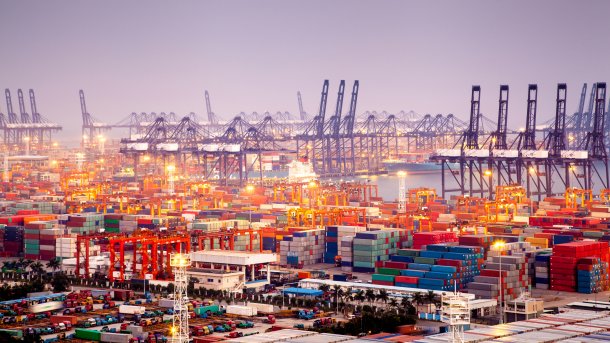New Series: De-Globalisation - How Independent Can Europe Be?
The past months have painfully shown that dependence on resources comes at a high price. But can the clock be turned back?

Closed during the pandemic: Port of Yantian, Shenzhen.
(Bild: zhangyang13576997233 / Shutterstock.com)
(Hier finden Sie die deutsche Version des Beitrags)
There is a mustard crisis in France. The globally popular condiment paste is a national treasure not only in Dijon, but supply problems are leading to empty shelves and high prices. The drought in Canada, one of the main suppliers of mustard seed, logistical problems and, of course, the war in Ukraine are cutting the French off from the coveted raw material. The market is bought dry.
France is not alone in this. Nor is mustard the only problem. Corona, China, war - the past few years have painfully shown the saturated Western industrialised countries how vulnerable the finely balanced and highly complex supply chains are. How dependent we have become on energy sources and raw materials from other countries. How central functioning logistics are for the "just in time" economy. And how quickly this supposedly stable world can come apart at the seams.
"Perfect storm"
There is hardly an industry that is not affected. Above all, the global semiconductor industry lives from highly complex supply chains that have been hit particularly hard by the corona virus. Add to this the exorbitant rise in energy prices, inflation and fear of recession, and you have what market observers call a "perfect storm". The outlook is gloomy.
Political conflicts are also exacerbating the situation. In the course of the trade war between the USA and China, the European network operators are caught between the fronts, and more and more governments are withdrawing their trust in the Chinese supplier Huawei. This makes an already manageable selection of suppliers even smaller - they too have problems and are thinking about price increases.
Videos by heise
The French are now discussing whether and how they can repatriate mustard production. Europe wants to emancipate itself, politically as well as economically, and not only from the superiority of the American tech giants. The slogan of "de-globalisation" is also spreading at the electronics trade fair IFA, which is taking place in Berlin these days.
Self-sufficient Europe?
But can we turn back the clock at all? It turns out: perhaps in some sectors. Take fibre optics, for example: the strategic dependence is less than might be expected at first glance, says Sebastian Glatz from the trade association ZVEI. Europe has a 15 percent share of global cable production: "Europe would be able to supply itself."
So let's take a look at the supply situation. In a series of articles we want to explore how far Europe could supply itself with strategically important raw materials and what that means for the industrial sector. On Friday, we will start with a key component of the politically desired shift to electric mobility: lithium.
(vbr)